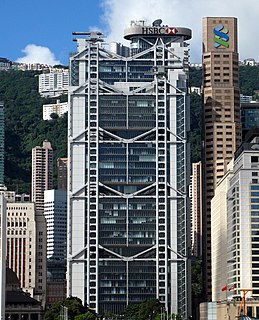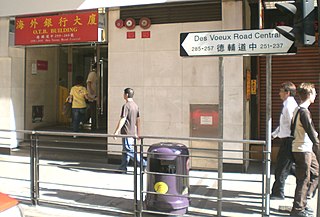| Economy of Hong Kong |
|---|
| Identity |
| Resources |
| Companies |
| Other Hong Kong topics |
| Hong Kong Portal |
The Hong Kong Association of Banks (HKAB; Chinese language:香港銀行公會 or 銀公會 in short) is an association created based on a series of Bank Ordinances enacted since 1948. In 1981 the association was established and replaced the Exchange Bank Association. The ordinance provides a framework for the Hong Kong Government to exchange views with the banking sector for the further development of the industry.

Chinese is a group of related, but in many cases not mutually intelligible, language varieties, forming the Sinitic branch of the Sino-Tibetan language family. Chinese is spoken by the ethnic Chinese majority and many minority ethnic groups in China. About 1.2 billion people speak some form of Chinese as their first language.

The Banking Ordinance is a set of laws passed by the Legislative Council of Hong Kong to tighten restrictions for opening up or licensing a bank. Prior to the 1964 re-regulations, the government had no way to control bank's monetary effect on the economy. It also had no way of protecting the people utilizing the institutions. Banking was considered a Laissez-faire network, and was also described as "Free Banking" or "Wildcat Banking" filled with much uncertainty.
Exchange Bank Association was originally established in 1897 in Hong Kong as a bank association in dealing with the exchange business. It then became an organization that set interest rates on bank deposits to keep bank competition alive and balanced.
Although banking licenses are granted by the Hong Kong Monetary Authority, no fully licensed bank can operate in Hong Kong is thus subject to HKAB's rules. Its members are the banks, not their employees. HKAB is under the auspices of its member banks, which are represented by their designated representatives in general meetings. Each member bank must designate a senior executive to represent it vis-à-vis HKAB at meetings.
A banking license is a legal prerequisite for a financial institution that wants to carry on a banking business. Under the laws of most jurisdictions, a business is not permitted to carry words like a bank, insurance, national in their name, unless it holds a corresponding license. Depending to their banking regulations, jurisdictions may offer different types of banking licenses, such as

The Hong Kong Monetary Authority is Hong Kong's currency board and de facto central bank. It is a government authority founded on 1 April 1993 when the Office of the Exchange Fund and the Office of the Commissioner of Banking merged. The organisation reports directly to the Financial Secretary.








